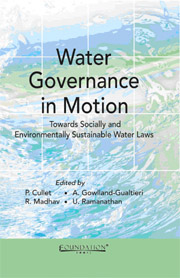Book contents
- Frontmatter
- Contents
- Acknowledgments
- Contributor Biographies
- Introduction
- I Water Law, Policy and Institutional Reforms in India
- 1 Water and Questions of Law: An Overview
- 2 Water Law – Evolving Regulatory Framework
- 3 Discourses in Water and Water Reform in Western India
- 4 The Slow Road to the Private: A Case Study of Neoliberal Water Reforms In Chennai
- II Ongoing Irrigation and Ground Water Reforms in India
- III Perspectives on Privatisation
- IV Environment and Human Rights
- V Comparative Perspectives on Reforms
- Bibliography
1 - Water and Questions of Law: An Overview
from I - Water Law, Policy and Institutional Reforms in India
Published online by Cambridge University Press: 26 October 2011
- Frontmatter
- Contents
- Acknowledgments
- Contributor Biographies
- Introduction
- I Water Law, Policy and Institutional Reforms in India
- 1 Water and Questions of Law: An Overview
- 2 Water Law – Evolving Regulatory Framework
- 3 Discourses in Water and Water Reform in Western India
- 4 The Slow Road to the Private: A Case Study of Neoliberal Water Reforms In Chennai
- II Ongoing Irrigation and Ground Water Reforms in India
- III Perspectives on Privatisation
- IV Environment and Human Rights
- V Comparative Perspectives on Reforms
- Bibliography
Summary
This paper aims at presenting a general overview of some of the important legal questions that arise in the course of the current international debates on water. It is not a detailed technical paper meant for a scholarly audience but a broad presentation, in simple terms, for the interested general reader. It is explanatory in nature, but it is also partly prescriptive, and in the latter aspect it is a personal statement. It draws upon Indian experience, but is not India-specific.
In the past, questions of law relating to water tended to arise mainly in three contexts:
(i) in the riparian context, regarding claims to the use of river waters arising from location in relation to a river, conflicts over such claims, complaints of injury caused by other (mainly upper) riparians, and so on (at the level of households, farms, villages, provinces or states, or countries);
(ii) in the context of wells (ground water, i.e., water lying under one's land), giving rise to the idea of ownership of or property rights over water; and
(iii) in the context of small ponds and lakes or springs near a village, perceived as ‘commons’ belonging to the community, giving rise to the idea of a common property resource.
All these were, of course, subject to the overarching sovereign powers of the state.
These three water sources were perceived as distinct, and governed by different legal principles.
- Type
- Chapter
- Information
- Water Governance in MotionTowards Socially and Environmentally Sustainable Water Laws, pp. 11 - 25Publisher: Foundation BooksPrint publication year: 2010

